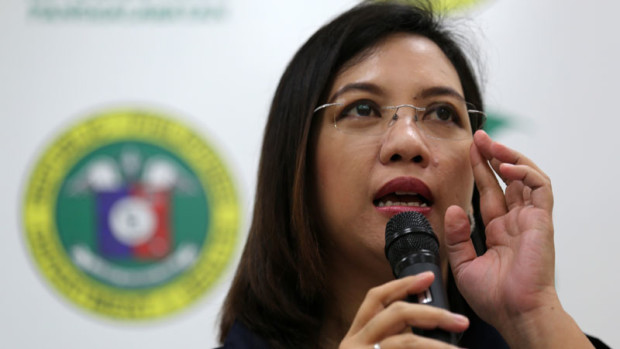
Former health secretary Janette Garin (INQUIRER FILE PHOTO/RAFFY LERMA)
MANILA — Former Health Secretary Janette Garin defended on Wednesday the Aquino administration’s dengue immunization program against allegations of undue haste in the procurement of newly approved vaccines shortly before the May 2016 elections.
Garin denied having negotiated the price with vaccine supplier Sanofi-Pasteur in a June 2015 conference and clarified that then president Benigno Aquino III did not meet with the pharmaceutical firm in France in December 2015.
During the continuation of the inquiry on Wednesday, Garin told lawmakers that Aquino only met the Sanofi representatives in a customary courtesy call during the Climate Change Conference then.
“It was not a meeting between Sanofi and President Aquino. It was the usual time where the President will allow himself to face the business community,” she said. “The dengue vaccine issue was not discussed.”
Garin also pointed out that the dengue vaccine “was already in the pipeline” for some time even before the procurement process began. “Even when I was not yet with DOH, it was announced in 2014,” she
noted.
Asked by Oriental Mindoro 1st Dist. Rep. Salvador Leachon why the P3.5-billion budget realigned to the purchase of the Dengvaxia vaccine was nearly equal to the total budget of the entire immunization program, Garin said it was not originally intended to turn out this way.
She explained that the Department of Health also tried to avail of the realigned funds for polio, Japanese encephalitis and pneumococcal conjugate vaccines. However, these were not approved by the Department of Budget and Management due to failure to submit all requirements at the time.
The dengue vaccine was not originally in the DOH’s procurement plan for the year 2016, and was only funded in December 2015. Around that time, the Food and Drug Administration had just approved the certificate of product registration for Dengvaxia on Dec. 22, 2015.
DOH Disease Prevention & Control Bureau officer-in-charge Ma. Joyce Ducusin explained that the agency still did not know yet the state of the dengue vaccine, which was why it was not included in its original budget.
The purchase of the vaccines also drew questions from legislators because it was not yet then included in the Philippine National Drug Formulary. In order to procure such medical items, the government is required to avail of a certification of exemption from the Formulary Executive Council under Executive Order No. 49, series of 1993.
But, the application for Dengvaxia was filed on Dec. 28, 2015 and was tackled by the FEC in three meetings beginning January 2016, before the exemption was granted on Feb. 3, 2016.
The Philippine Children’s Medical Center (PCMC), which acted as the procuring entity for 600,000 vials (equivalent to three million doses), was also questioned for issuing a purchase request on Jan. 21, 2016, even before it was cleared by the FEC.
PCMC executive director Julius Lecciones said this “happens a lot in government procurement,” explaining that if the notice of award has not been issued, the agency could terminate the bidding process if it failed to secure the requirement from the FEC.
Leachon also raised the issue of whether Undersecretary Kenneth Hartigan-Go pressured the FEC into recommending the approval of the exemption by saying it was a “political decision.”
FEC member Clotilde How, however, said “it did not come off that way.”
“We were just informed things were moving towards the approval of the vaccine by the Secretary of Health or a higher committee,” How said. “We were just requested . We were not ordered to make a decision. FEC is recommendatory.”
Hartigan-Go, meanwhile, said his statement was taken out of context, because he meant to say the DOH had “made a political decision to allocate funds,” which was outside the FEC’s purview on the scientific and technical aspects.
The immunization program was implemented starting April 4, 2016. However, only 493,000 schoolchildren, or less than half the one-million target, were vaccinated in the first round. Numbers dropped even more to 416,508 and 97,515 for the administering of the second and third doses, Ducusin said. SFM

